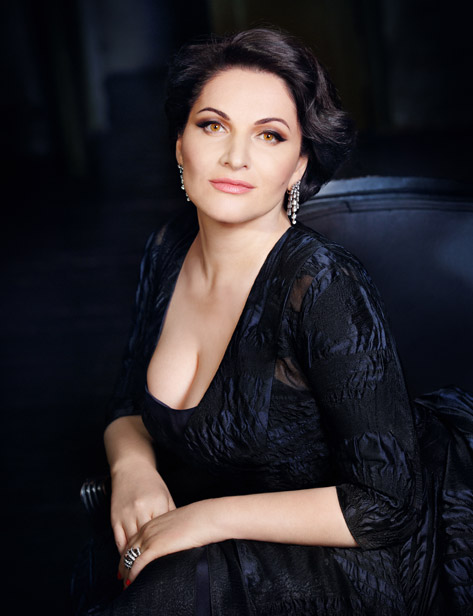Gerzmava brings dramatic flair, Russian soul to Carnegie recital

The Russian soprano Hibla Gerzmava has been increasing her profile in New York in the last few years. In 2015 she had an outstanding run as Liu in Turandot at the Metropolitan Opera (a role she will reprise there this spring) and followed it with an impressive recital at Carnegie Hall. The Carnegie recital she gave this Friday featured a lot of fine singing, but was marred here and there by odd interpretive choices.
Or, more simply, basic choices of presentation. One might complain about Ekaterina Ganelina’s approach to the piano, using an aggressive attack that made even the tenderest lines jump—but it would be unfair to judge, as the lid was on a quarter stick for the entire program, dissolving most of her playing into a murky soup under the lid. This was an odd choice, as Gerzmava’s voice is not exactly small, and it meant that the sonic balance was off for the entire night.
Friday’s program began with a full first half of Russian songs, and Gerzmava brought a particular kind of dramatic flair, toying with an enormous black cape that trailed behind her as she took the stage. In an opening set by Glinka, she showed off a powerful instrument, dark in color, with a rich velvet texture, but still cool and clear as it resonated throughout the hall. She brought a keen narrative style, rich with melancholy, to “The Lark,” and finished the first set with “I am here, Inezilia,” achieving a dance-like feel with her bold, energetic singing, matched by the whirling waltz of the piano.
Ganelina showed a softer touch in the first of three songs by Rimsky-Korsakov, “Not the Wind, Blowing from the Heights.” Here she channeled a warm, hazy breeze, while Gerzmava sang over the piano with gentle longing. “The Lark Sings Louder” was sung with bracing fervor and a feel of romantic heroism, even if the coordination between soprano and piano was a little disjointed.
Closing the first half was Prokofiev’s Five Poems of Anna Akhmatova, a brief, haunting cycle that flows all the way through without pause. Gerzmava felt especially at home in these expressive songs, finding innocent wonder in the first bright burst of “The Sun Has Filled My Room.” Her tone often grows a little hard towards the top, but she compensates by reining in her intensity and letting the sound expand, as in the gentle sadness of “Memory of the Sun.” Most compelling of all in this set was “The Grey-Eyed King,” where she wove an unsettling calm with her vivid delivery.
On the second half came a grab-bag assortment of arias and art songs, starting with the famous mad scene from the end of Donizetti’s Anna Bolena. This scene tests every aspect of a soprano’s abilities, from acting, to technical precision, to musical subtlety. Gerzmava’s interpretation impressed on the whole, finding a thrilling blaze in her top, and crafting a compelling dramatic arc. Intonation problems nagged her throughout, though, and her voice is a little too big to feel natural as it flies through the cabaletta’s scorching arpeggios.
An excessive helping of grand opera gestures (featuring a new cape in turquoise) seemed to get in the way of real character connection in many of these arias, including in a somewhat over-pressed “Pace, pace mio Dio,” from Verdi’s La Forza del Destino. A more restrained approach served Gerzmava well in two songs by Gabriel Fauré: she brought a lovely soft voice and rich colors to “Après une rêve,” and followed with a light, free rendition of “Le papillon et la fleur,” which featured Ganelina’s best playing of the night, as the pianist achieved a breathless charm in the fleet playing of her running scales. An impressive performance of “Tacea la notte placida,” Leonora’s aria from Il Trovatore, proved a perfect ending to the program. Gerzmava gave a spacious, nuanced rendition of the aria and found sparkling energy in the cabaletta.
Gerzmava offered two encores to close Friday’s concert: first came a luscious, hammy rendition of Ernesto de Curtis’s classic Neapolitan song “Non ti scordar di me.” It looked like that might be the end of the night, but after encouragement from her most devoted fans in the crowd she offered the thrilling folk dance “Travushka-muravushka,” the same fiery number with which she closed her Carnegie recital back in 2015.


